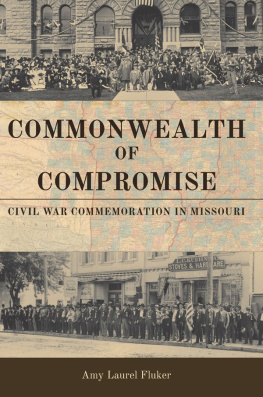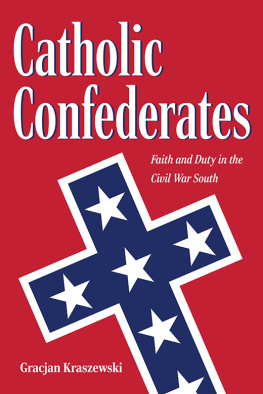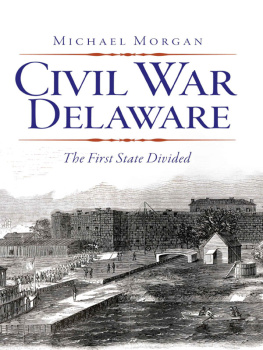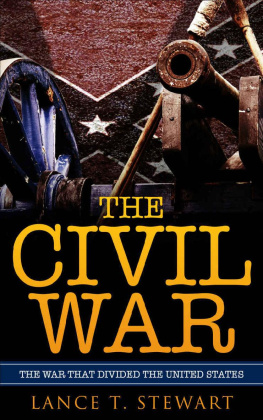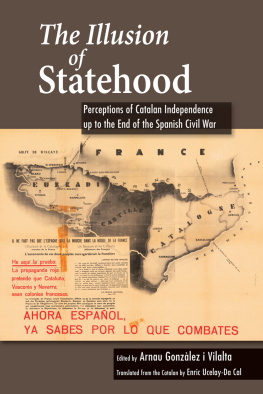The Revolution of 1861
CIVIL WAR AMERICA
Gary W. Gallagher, Peter S. Carmichael,
Caroline E. Janney, and
Aaron Sheehan-Dean, editors
This book was published with the assistance of the Fred W. Morrison Fund for Southern Studies of the University of North Carolina Press.
2012 The University of North Carolina Press
All rights reserved
Designed and set in Miller by Rebecca Evans
Manufactured in the United States of America
The paper in this book meets the guidelines for permanence and durability of the Committee on Production Guidelines for Book Longevity of the Council on Library Resources.
The University of North Carolina Press has been a member of the Green Press Initiative since 2003.
Library of Congress Cataloging-in-Publication Data
Fleche, Andre M.
The revolution of 1861 : the American Civil War in the
age of nationalist conflict / Andre M. Fleche.
p. cm.(Civil War America)
Includes bibliographical references and index.
ISBN 978-0-8078-3523-4 (cloth : alk. paper)
1. United StatesHistoryCivil War, 18611865Causes. 2. Nationalism
United StatesHistory19th century. 3. NationalismSouthern States
History19th century. 4. NationalismConfederate States of AmericaHistory.
5. Self determination, NationalUnited StatesHistory19th century. 6. Self
determinationEuropeHistory19th century. 7. EuropeHistory18481849.
8. RevolutionsEuropeHistory19th century. I. Title.
E459.F54 2012 973.7dc23 2011024071
16 15 14 13 12 5 4 3 2 1
for Meredith
Contents
Introduction
The American Civil War and the Age of Revolution
1
World Revolutions and the Coming of the American Civil War
2
The Revolution of 1861
3
The Problem of Northern Nationalism
4
The South and the Principle of Self-Determination
5
The Last Best Hope of Earth
6
The White Republic
Conclusion
American Nationalism and the Nineteenth-Century World
Illustrations
Grand Military Reception of Governor Kossuth
Carl Schurz
Presentation of Colors to the Garibaldi Zouaves
Giuseppe Garibaldi
Street Fighting in Naples
Rev. H. W. Beecher Defending the American Union
Sacking Brookss Clothing Store
Acknowledgments
ONE OF THE PLEASURES OF COMPLETING A PROJECT IS CALLING TO mind all of the people who have helped to bring it to fruition. The research for this book began at the University of Virginia, and many friends, colleagues, and mentors have influenced the books development. First and foremost, I must thank Gary W. Gallagher for his instruction, advice, and professional example. He taught me much about history and scholarship, and raised my aspirations in countless ways. His influence truly made a difference in my life.
Many others at Virginia and beyond offered me feedback and advice. Peter Onuf took an early interest in this project, and his comments, questions, and timely interventions guided me as I formulated my arguments. I also benefited from the wisdom of Edward L. Ayers and Michael F. Holt, both of whom commented on portions of this book. Sophia Rosenfeld and Stephen Cushman read an early version of the manuscript in its entirety and offered suggestions and advice. Brian Owensby encouraged me to think beyond the borders of the United States, and Stanley Nadel provided commentary on my discussion of German forty-eighters. The dedicated staff at the Alderman and Harrison-Small special collections libraries aided me in many ways throughout the course of my research.
A vibrant and collegial community of talented scholars at the University of Virginia made studying in Charlottesville exciting. I especially enjoyed participating in the Civil War Era seminar, a group that met frequently to share works in progress. Its members, Keith Harris, Wayne Wei-Siang Hsieh, Caroline Janney, Jaime Martinez, John Mooney, Cynthia Nicoletti, Katherine Pierce, Aaron Sheehan-Dean, Matthew Speiser, and Kid Wong-srichanalai, all read drafts of my chapters, discussed my ideas, and challenged my thinking. Many other friends and colleagues with a wide variety of interests also influenced me and made my time at Virginia a happy one, including Carl Bon Tempo, Benjamin Carp, Kristin Celello, Peter Flora, Laurie Hochstetler, Derek Hoff, Kurt Hohenstein, Christopher P. Loss, Moritz Mlzer, Rob Parkinson, Chris Nehls, Brian Schoen, and Ethan Sribnick.
In 2006, I was fortunate enough to join the globally oriented and interdisciplinary Department of History, Geography, Economics, and Politics at Castleton State College. I could not have asked for a more supportive group of colleagues. I thank Adam Chill, Melisse Pinto, Judy Robinson, Scott Roper, Jonathan Spiro, Trish van der Spuy, and Carrie Waara, all of whom encouraged my research and read portions of my manuscript. The excellent staff at the colleges Calvin Coolidge Library assisted me in the final stages of my work, and Lauren Olewnik and Franny Ryan helped me track down some crucial interlibrary loan materials.
The editors and staff at the University of North Carolina Press have worked with skill and professionalism in bringing this project to print. I would like to thank David Perry in particular for his expertise and patience during the long process of turning a manuscript into a book. Zach Read and Paul Betz worked with me through the steps of submission and editing, and copyeditor Jeff Canaday skillfully helped polish the text. Two anonymous reviewers twice read drafts of the entire manuscript, and their suggestions and advice helped to make this a much better book than it would have otherwise been.
Above all, my family has been a source of strength, support, and inspiration. My parents, Timothy and Ellen Fleche, have always encouraged me in everything I have attempted. They fostered my interests, and their love and dedication gave me the courage to pursue my goals. My brothers, Justin and Alexandre, have stood by me in many endeavors and continue to play an important part in my life. I have also been blessed with a large and supportive extended family. My grandparents, Edwin and Virginia Fleche and Evelyn and the late Edgar Tomkin, along with all the members of the Fleche and Tomkin families, have been a source of comfort, guidance, and good cheer. My in-laws, the Petersons, and especially Gail Chapman and Steve Vogl, have touched me with their support, their generosity, and their interest in my studies. My wife, Meredith Chapman Fleche, has contributed to this project since the beginning. She has enthusiastically discussed ideas with me, served as editor and confidante, and, most recently, helped prepare images for the manuscript. She has shared many adventures with me and made many personal sacrifices to support this project. For these reasons, I have dedicated this book to her.
The Revolution of 1861
Introduction
The American Civil War and the Age of Revolution
ON JUNE 15, 1864, ERNEST DUVERGIER DE HAURANNE ARRIVED IN New York to observe the final act of what he would later call five years of revolution, political turmoil and civil war in the United States. The French liberal hoped to follow in the footsteps of Alexis de Tocqueville, a close family friend, by observing American democracy in action. While his illustrious predecessor had reported to French readers on the promise as well as the problems of a functioning republic, Duvergier de Hauranne would document how a democratic people dealt with the disintegration of their nation.
Federal and Confederate partisans wasted little time in outlining their positions. One Union officer explained to the visitor that the abolition of slavery and the defeat of the rebellion would ensure the survival of the United States. Slavery and rebellion were inextricably linked in the soldiers mind. Slavery, he believed, posed a dire threat to Americas experiment in modern nation-building. The uncompensated labor of enslaved human beings, he held, had led to the concentration of wealth in the hands of a select few. The class interests of rich planters ran counter to the development of a united polity based on the sovereignty of all the people, making true nationalism impossible. Slavery, he told the French visitor, threatened to lead to the emergence of a military aristocracy. Destroying the institution would level the social hierarchy, thereby sustaining a nation based on representative government. Give us a little more time, the officer concluded, and that arrogant class that calls itself the aristocracy of the South will sink into the mass of the common people. Duvergier de Hauranne agreed. The newcomer to America immediately made connections between southern planters and the landed nobility that had so often resisted change in his native France. He became gradually convinced that slavery in the South, bound up as it was with the ownership of land, was
Next page

